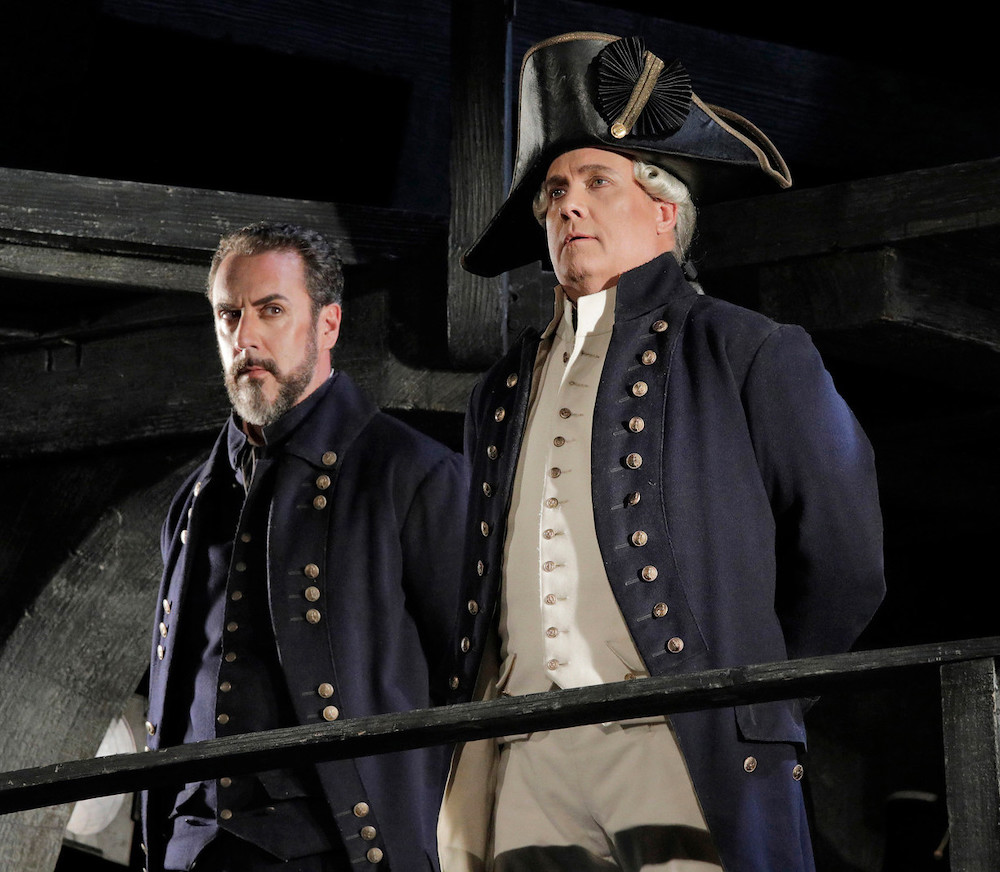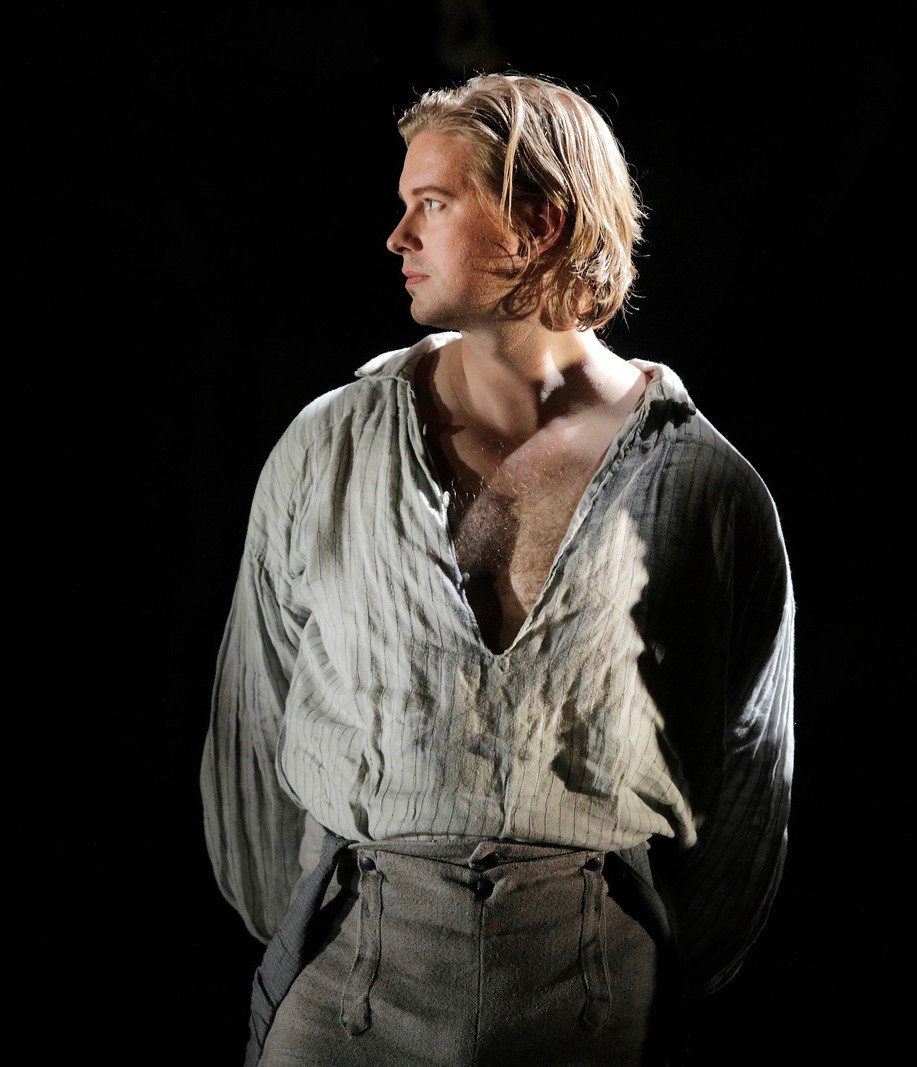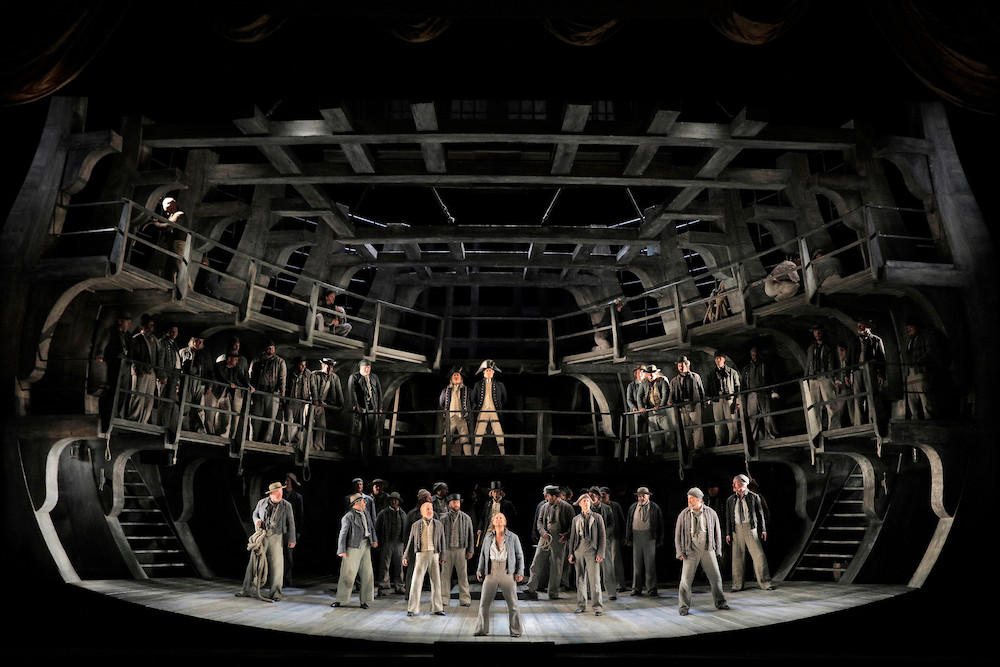Out of the near dark an old man hobbles slowly to the front of the stage. With a light illuminating only his face and chest, creating the image of an unfinished man, a half of a man, he begins his story. He is Captain Edward Fairfax Vere, who commanded the British warship “Indomitable” during the Napoleonic Wars. And he is filled with self-doubt and remorse as he looks back at his failure as a leader of men.
Vere will also close Benjamin Britten’s opera Billy Budd, because the opera despite its name is, finally, about Vere and the conflict between intuitive human compassion versus the justice hammered out by institutions of war and civilization.

Britten’s sonically brilliant opera, which premiered in London in 1951, opened at San Francisco Opera this past weekend in an insightful and powerful production by British director Michael Grandage. The production premiered at the UK’s much admired Glyndebourne Festival in 2010, and was revived at the Brooklyn Academy of Music in 2014.
Tenor William Burden sings the role of Vere, a part originally written for Britten’s longtime muse and partner, Peter Peers. What Burden brings to the role is an unblemished, focused tenor, a thoughtfully restrained portrayal and impeccable diction.
Along with Vere are the two men who will test his sense of mercy and justice, the young and innocent sailor Billy Budd and his antagonist John Claggart, the sadistic master-of-arms responsible for discipline on board ship. Though much is often made of the suppressed homoerotic relationship of the two men, a perception sourced in librettist E. M. Forster and emphasized by today’s concerns, what they more clearly represent are forces of good and evil, innocence and perverse cruelty, both innate. As Grandage’s production makes clear.

Billy Budd is sung by baritone John Chest, who has a vibrant voice laced with a quality of pathos. Chest’s portrayal is eager and impetuous. And the role is a difficult one. As baritone Roderick Williams said of the part, “how does one portray an angel without making him, frankly, a bit dull?” It is much easier, he adds, to flesh out “monsters of men”.
Innate goodness is also disadvantaged in this opera. As Veer and his officers affirm, “goodness is always flawed.” In Billy’s case the flaw is a stammer – an inability to express his feelings verbally when agitated. It leads to him killing Claggart, his false accuser, which in turn leads to his hanging by order of the Acts of War. Vere, who could save him by asking for mercy from Budd’s judges, refuses to do so, presenting only evidence and thus abandoning both the young sailor and his own sense of justice.
The monster of a man, John Claggart, is left to bass-baritone Christian Van Horn, who does a spectacular job of fleshing out evil itself as Claggart. To an ominously deep and resonant voice Van Horn adds a tall and controlled presence, one easily read as compelled by the desire for power and harm.
The vocal triangle of the three men creates a web of contrast and motion throughout the sonic landscape, even though they never sing in harmonies but rather in dialog. They are seconded by smaller roles: the older sailor Dansker (bass-baritone Philip Skinner), Donald (baritone John Brancy) and the Novice (tenor Brenton Ryan), among many others.
To that shifting and luminous web of solitary voices is contrasted the chorus, which in its near ever-present background of song composed of words that are more like sound than words – “oh heave, heave away”, “blow oh, blow” – intermingled with Greek chorus–like warnings becomes oceanic, rising and falling through the orchestration.

The all-male cast and chorus – some 75 singers – add to the sense of a starkly closed world, a quality reinforced by Christopher Oram’s sets. The stage is dominated by a representation of a ship cut in half widthwise, the struts of the various levels of the ship curving inwards to form something resembling a huge cage. During the long and gorgeous orchestral interludes a grid or a wall would slowly descend to give a claustrophobic air to the sailors’ lower deck or the exclusive remoteness of the captain’s haven.
Finally, it is Britten’s music that captivates. Under the direction of Lawrence Renes, the orchestra superbly presents the opera’s unceasing descriptive beauty: the hushed strings under Vere’s confession, the saxophone’s plaintive call mimicking the sailors’ pain and loneliness, and the moment of Billy Budd’s death when the stacked notes of the entire orchestra peal slowly away from the lowest sounds to the highest until there is nothing but a thin wisp of sound, and Billy’s life departing like the poignantly small whimper of a child’s last breath.
– Jaime Robles
Billy Budd continues at San Francisco Opera through September 22. For tickets and information, visit sfopera.com.
